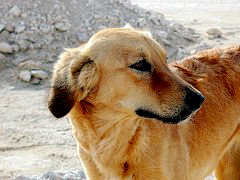 Steve Sailer linked to a fascinating post on the origins of the domestic dog by a U.K. "tetrapod zoologist," Darren Naish, who actually looks bipedal to me.
Steve Sailer linked to a fascinating post on the origins of the domestic dog by a U.K. "tetrapod zoologist," Darren Naish, who actually looks bipedal to me.The conventional wisdom is that the dog is descended from some form of wolf, probably an Asian one. Naish points out that wolf behavior is not really compatible with any plausible story of domestication. Wolves are too big too live on camp scraps, too given to fighting over food, too driven to chase prey when early humans probably hunted by stealth, and have the wrong pack structure (only the top wolf pair breeds).

It's more likely, concludes Naish, that there was some form of canid, perhaps similar to the Qatar dog (above) and New Guinea Singing Dog (right) portrayed here, from which the domestic version emerged. Feral and pariah dogs tend to look like these fellows.
Think Indian pariah dogs, Basenji hounds, and Canaan dogs, "third world dogs" in general.
If domestic dogs aren’t wolves, what are they?I love this stuff. Enough John McCain already. As Ferlighetti says of the dog who "trots freely in the street":
All of this begs the question: if domestic dogs aren’t wolves, what are they? The answer seems to be that Canis familiaris is a distinct species with its own independent history. Prior to domestication, it presumably existed as a relatively small, generalized canid that voluntarily adopted the commensal pariah niche still occupied by many dog populations today. This is supported by the morphological and molecular distinctiveness of domestic dogs, by the anatomy and behaviour of primitive domestic dog breeds, and by the archaeological and fossil record.If this is true then the truly wild ancestors of modern domestic dogs are extinct. True, there are wild pariah-type dogs in various places around the world (there are wild populations of New Guinea singing dogs and dingos, for example), but they’ve been introduced by people. However, the lack of the original wild form in a species that has become domesticated or at least semi-domesticated is not unprecedented nor unusual: Dromedaries Camelus dromedarius, for example, only exist in the wild today in feral form, and are otherwise entirely domesticated, and the wild ancestors of modern domestic horses and cattle are entirely extinct. In fact the eradication of the wild ancestors of a domestic form is thought by some to one of the key historical events that occurs during the domestication process (Dobney & Larson 2006).
But he has his own free world to live inRead the whole thing: first Naish, and then Ferlinghetti.
His own fleas to eat
He will not be muzzled
Congressman Doyle is just another
fire hydrant
to him

No comments:
Post a Comment